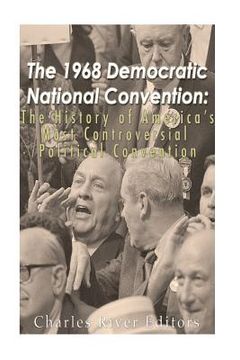The 1968 Democratic National Convention: The History of America's Most Controversial Political Convention (en Inglés)
Reseña del libro "The 1968 Democratic National Convention: The History of America's Most Controversial Political Convention (en Inglés)"
*Includes pictures *Profiles the race for the nomination in 1968 *Includes accounts of the riots and some of the turmoil inside the convention hall *Includes online resources and a bibliography for further reading *Includes a table of contents "This is fantastic and it's only Sunday night. They might declare martial law in this town." - Jerry Rubin, one of the Yippie leaders, August 25, 1968 "Law and order will be maintained." - Chicago Mayor Richard Daley In 1968, the Republican Convention was a display of congeniality and unity, despite the various factions each supporting a separate candidate. Choosing Spiro Agnew as his running mate, Richard Nixon won the nomination on the first ballot, with Ronald Reagan moving to make it unanimous. Conservatives such as Barry Goldwater and Strom Thurmond immediately joined in the support. From that moment, the results of Nixon's work since the 1962 defeat took effect, and he demonstrated himself to be a far more thoughtful and careful candidate than in the past. The image of a "New Nixon" emerged, "more statesmanlike, less combative, more mature and presidential." The Democrats, on the other hand, were in terrible disarray. The Vietnam War raged with no honorable end in sight, President Kennedy had been assassinated several years before, and public unrest at home grew by the day. Even still, when Senator Eugene McCarthy decided to throw his hat into the ring in 1968, it was a surprise, but it was an even greater one when he was only narrowly defeated in the first primary in New Hampshire on March 12th. Though President Lyndon B. Johnson had won the primary, the close margin made him appear vulnerable, an unusual position for a sitting president, and after McCarthy's close shave in New Hampshire, Senator Bobby Kennedy judged the time was right to enter the race. With "Camelot" still fresh in America's minds, he declared his candidacy for the Presidency of the United States, and Bobby announced his candidacy from the same location where his brother had announced his own 8 years earlier: the Russell Senate Office Building in Washington. The McCarthy campaign charged that he was an opportunist, relying on McCarthy's initial candidacy before declaring its own, but regardless, the Kennedy name continued to attract Americans across the country, and Bobby seemingly represented another chance at Camelot. Kennedy seemed to be on the rise during the summer, only to be assassinated by Sirhan Sirhan on the night he won the California primary. At this point, Johnson's own vice president, Hubert Humphrey, entered the race despite having not competed at all during the first half of the year. In 1968, the process of electing a nominee was not as well established as it is today. In fact, far from today's process, not all states held a primary; at the time, only 13 states held primaries. At the convention, the anti-war faction did not fully line up behind McCarthy as expected, and Humphrey won the nomination in one of the ugliest convention displays in American history. Today, the 1968 Democratic National Convention is less known for its results - Vice President Humphrey was nominated and Maine's Edmund Muskie was chosen as his running mate - and much better known for the protests that culminated with riots in Chicago outside of the convention hall. Police intervention on the convention floor and the violence outside were all witnessed on live television, and the fiasco left the Democratic Party shattered and running from far behind. In an additional twist, Alabaman George Wallace mounted a national campaign as the candidate for the American Independent Party, receiving significant support in the Deep South. As a result, Republican candidate Richard Nixon, who had been all but banished from political life after the loss in 1960 to John F. Kennedy, won the 1968 election by almost half a million votes, good enough to create an electoral landslide.

